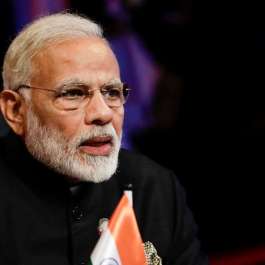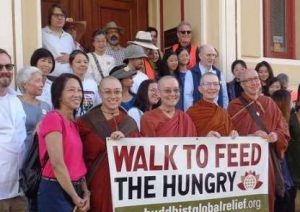Original Chinese text: Venerable Jieyu
Translation: Zakiyyah Wahab
English editing: Cathy Ziengs
In this modern age where less attention is placed on faith and religion, those who practice veneration will be blessed.
Veneration not only exists in the religious world; it can also be applied to the arts, a culture, a certain morality or even an ideology such as communism. This allows us to discover and believe in something of greater existence beyond ourselves, enabling us to attain higher and deeper states of mind.
Many people are easily satisfied with just materialistic pursuits and the desire to simply survive in society in a way that will personally benefit them. It will be difficult for such people to realize the happiness and good fortune created by veneration.
The people in Turkey definitely venerate. In the mosques that you see everywhere in each city throughout the country, there is evidence of their reverential worship. I was told that locals visit the mosque five times every day for regular prayer, as well as to intensify their devotion. I witnessed a local man faithfully praying; the look on his face was nothing short of concentration and sincerity.
That immediately reminded me of a time when I visited an elderly woman in Sri Lanka. The devotion and purity that radiated from her touched me deeply and made me realize how blessed and lucky people are who keep some kinds of veneration in their hearts. When another monk and I were invited into the Sri Lankan woman’s home, she stood first in line and the rest of the family behind her according to age. The gentle woman took the lead and knelt down, pressing both her hands on our feet to show her respect. Then the rest of her family followed accordingly. This prostration was the same as “kowtow”, a sign of highest reverence in Han Chinese culture. It is an act of respect that also exists in Thailand – even the King of Thailand performs the ritual when he encounters monks.
It felt as if an electric current ran through my heart the moment the woman kneeled down. She is definitely blessed. Perhaps she may not understand the profound doctrines of Buddhism, and she just held a kind of veneration towards goodness. Her act was so completely sincere and voluntary, that there was a strong power to destroy the hard attachment around ‘self’. While it has always been a social norm for the young to show their respect to the elderly, this Sri Lankan woman demonstrated the opposite when she kneeled down in front of someone who was the same age as her grandchildren. It was difficult to experience this kind of peace and serenity from veneration especially in a country where people are arrogant and egotistical because of their wealth, social position, and education.
I believe that people in Turkey are well aware of the good things resulting from veneration. Otherwise, their faces would not light up with pride and happiness when they speak of Allah. Their faith or their veneration in Allah has given them strong motivation to serve the community and also to live with strong moral convictions. They believe that constant and attentive devotion will bring them closer to Allah, closer to heaven. The principled way of living for my Muslim friends reminds me of the Five Precepts in Buddhism.
During the ten days that I spent in Turkey, it was Ramadan for Muslims. They were forbidden to eat or drink from when the sun rose to sunset. At first, I thought they were only forbidden to eat during daytime for a duration of 30 days, but when I found out that they were not allowed to even drink water, I was in awe. Our two Turkish tour guides took us to many outdoor tourist places in very hot weather. I drank bottle after bottle of water, but still felt that my mouth was always dry. However, our Turkish hosts needed to purchase entrance tickets for us, explain the histories of the places we visited and even to help us take photos, and so on. At first, I did not believe that these two friends would not drink a single sip of water the entire day, but I then realized that this act of fasting was a test of endurance for them. At times, they appeared to be exhausted and sleepy (especially during the hottest time of the day), and I could tell that they had to summon their strength to answer the questions we had. Yet I never saw them display any hint of dissatisfaction the whole time; instead, what I witnessed was pleased enthusiasm.
I believe that after succeeding in such a test of endurance and devotion, the Five Precepts practice would not be anything difficult for my Muslim friends, since I have seen for myself the willpower and fortitude of my fellow Turkish brothers. And, I can also feel that such a nation with deep veneration is soulful (Inner energy), united, and fortunate.
















